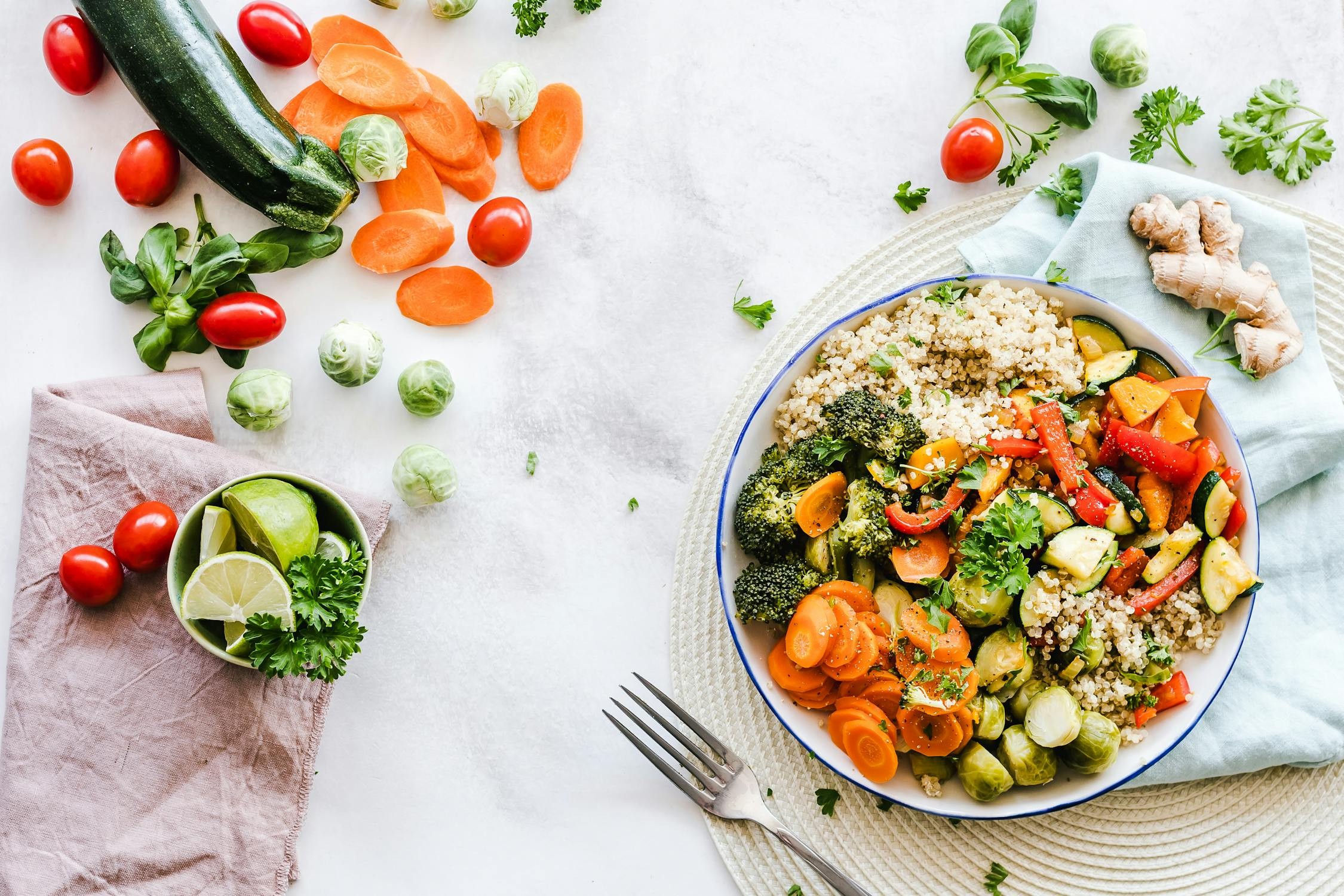Stopping food from fermenting in your stomach involves understanding the causes and implementing practical strategies. At FOODS.EDU.VN, we’re dedicated to providing you with clear, actionable advice to manage digestive discomfort and promote gut health. By focusing on mindful eating, dietary adjustments, and lifestyle changes, you can reduce fermentation and improve your overall well-being. This comprehensive guide delves into effective methods, ensuring a balanced gut microbiome and reducing unwanted symptoms like bloating and gas.
1. What Causes Food Fermentation in the Stomach?
Food fermentation in the stomach occurs when undigested carbohydrates are broken down by bacteria, producing gas and other byproducts. This process is normal to some extent, but excessive fermentation can lead to discomfort. Let’s explore the primary causes:
- Poor Gut Microbiome Balance (Dysbiosis): An imbalance in the gut microbiome, where harmful bacteria outnumber beneficial bacteria, can lead to increased fermentation. According to research from the American Society for Microbiology, a healthy gut microbiome is crucial for efficient digestion and preventing excessive fermentation.
- High FODMAP Diet: FODMAPs (Fermentable Oligosaccharides, Disaccharides, Monosaccharides, and Polyols) are short-chain carbohydrates that are poorly absorbed in the small intestine. When they reach the large intestine, they are fermented by bacteria, leading to gas production.
- Consumption of Processed Sugars and Carbohydrates: Processed sugars and refined carbohydrates are easily broken down, leading to rapid fermentation. A study in the Journal of Nutritional Science found that diets high in refined sugars can disrupt the gut microbiome and increase fermentation.
- Emulsifiers in Processed Foods: Emulsifiers, commonly found in processed foods, can disrupt the gut microbiome and increase gut permeability, leading to inflammation and fermentation. Research published in Inflammatory Bowel Diseases suggests that emulsifiers like carboxymethylcellulose and polysorbate 80 can negatively impact gut health.
2. How Can Mindful Eating Reduce Fermentation?
Mindful eating is a practice that involves paying full attention to the eating experience, including the sight, smell, taste, and texture of food. It can significantly reduce fermentation by promoting better digestion.
- Chew Food Thoroughly: Chewing is the first step in digestion. Saliva contains amylase, an enzyme that breaks down carbohydrates. Chewing food thoroughly reduces the burden on the stomach and small intestine.
- Eat Slowly and Without Distractions: Eating slowly allows you to recognize when you’re full, preventing overeating, which can lead to undigested food and fermentation.
- Focus on Sensory Experience: Tuning into the senses enhances the enjoyment of food and promotes better digestion by stimulating digestive enzymes.
- Avoid Eating on the Go or When Stressed: Stress can impair digestion by diverting blood flow away from the digestive system. Eating in a relaxed state promotes optimal digestion.
3. What Dietary Adjustments Can Minimize Gut Fermentation?
Adjusting your diet is crucial for minimizing gut fermentation. Here are some dietary strategies:
-
Reduce High FODMAP Foods: Temporarily reducing high FODMAP foods can alleviate symptoms. Common high FODMAP foods include garlic, onions, apples, pears, beans, lentils, and wheat.
Food Category High FODMAP Foods Low FODMAP Alternatives Fruits Apples, Pears, Watermelon Bananas, Blueberries, Grapes Vegetables Garlic, Onions, Asparagus Carrots, Spinach, Tomatoes Legumes Beans, Lentils, Chickpeas Quinoa, Tofu Dairy Milk, Ice Cream, Soft Cheeses Almond Milk, Lactose-Free Milk Grains Wheat, Rye Rice, Oats, Gluten-Free Bread Sweeteners High-Fructose Corn Syrup, Honey Maple Syrup, Stevia -
Limit Processed Sugars and Refined Carbohydrates: These are easily fermented. Opt for complex carbohydrates and natural sugars in moderation.
-
Increase Protein and Healthy Fats: A balanced diet with sufficient protein and healthy fats can reduce the focus on carbohydrates, thereby minimizing fermentation. According to a study in the American Journal of Clinical Nutrition, adequate protein intake supports a healthy gut microbiome.
-
Incorporate Fermented Foods: Fermented foods like yogurt, kefir, sauerkraut, and kimchi contain probiotics that can improve gut health. A review in Nutrients suggests that probiotics can help restore balance in the gut microbiome.
-
Avoid Emulsifiers: Check food labels and avoid products containing emulsifiers like carboxymethylcellulose, polysorbate 80, and carrageenan.
-
Choose Cooking Methods Wisely: Using a slow cooker or pressure cooker can help soften foods like meats and beans, making them easier to digest.
4. What Lifestyle Changes Can Aid Digestion and Reduce Fermentation?
Beyond diet, several lifestyle changes can support healthy digestion and reduce fermentation.
- Stay Hydrated: Drinking plenty of water helps maintain regular bowel movements and prevents constipation, which can contribute to fermentation.
- Get Regular Exercise: Exercise promotes gut motility and reduces stress, both of which can improve digestion. The Mayo Clinic recommends at least 30 minutes of moderate exercise most days of the week.
- Manage Stress: Chronic stress can disrupt the gut microbiome and impair digestion. Practice stress-reducing activities such as meditation, yoga, or deep breathing exercises.
- Avoid Grazing: Frequent snacking can prevent the digestive system from fully processing food, leading to fermentation. Try to stick to three balanced meals per day.
- Limit Alcohol and Caffeine: Both alcohol and caffeine can irritate the gut lining and disrupt digestion.
5. How Can Probiotics and Prebiotics Improve Gut Health?
Probiotics and prebiotics play a crucial role in maintaining a healthy gut.
- Probiotics: These are beneficial bacteria that can help restore balance in the gut microbiome. They can be found in fermented foods or taken as supplements. A meta-analysis in the Journal of the American Medical Association found that probiotics can reduce symptoms of bloating and gas.
- Prebiotics: These are non-digestible fibers that feed beneficial bacteria in the gut, promoting their growth and activity. Good sources of prebiotics include onions, garlic, bananas, oats, and flaxseeds.
- Choosing the Right Probiotics: Different strains of probiotics have different effects. Lactobacillus and Bifidobacterium are two common types of probiotics. Consult with a healthcare professional to determine which strains are best for your specific needs.
6. What Role Do Digestive Enzymes Play in Reducing Fermentation?
Digestive enzymes help break down food into smaller, more easily absorbed molecules. Supplementing with digestive enzymes can reduce fermentation by improving digestion.
- Types of Digestive Enzymes: Common digestive enzymes include amylase (for carbohydrates), protease (for proteins), and lipase (for fats).
- Benefits of Enzyme Supplements: Enzyme supplements can help digest food more efficiently, reducing the amount of undigested food available for fermentation.
- When to Use Enzyme Supplements: Consider enzyme supplements if you experience bloating, gas, or indigestion after meals.
- Consulting a Healthcare Professional: Before starting any supplement, it’s important to consult with a healthcare professional to ensure it’s appropriate for you.
7. What Are the Potential Benefits of Herbal Remedies?
Certain herbal remedies can help soothe digestive discomfort and reduce fermentation.
- Peppermint: Peppermint oil can relax the muscles in the digestive tract, reducing spasms and bloating.
- Ginger: Ginger has anti-inflammatory properties and can promote gut motility.
- Fennel: Fennel seeds can help relieve gas and bloating.
- Chamomile: Chamomile has calming properties and can help reduce stress, which can improve digestion.
- Using Herbal Remedies Safely: While herbal remedies can be effective, it’s important to use them safely. Consult with a healthcare professional before using herbal remedies, especially if you are taking medications or have underlying health conditions.
8. How Can Medications Affect Gut Fermentation?
Certain medications can disrupt the gut microbiome and increase fermentation.
- Antibiotics: Antibiotics kill both harmful and beneficial bacteria, leading to dysbiosis and increased fermentation.
- Acid Blockers (Proton Pump Inhibitors): These medications reduce stomach acid, which can impair digestion and increase the risk of bacterial overgrowth.
- Other Medications: Some other medications, such as NSAIDs and certain antidepressants, can also affect gut health.
- Medication Review: If you are taking medications that may be affecting your gut health, talk to your doctor about a medication review.
9. What Are the Key Signs of Excessive Gut Fermentation?
Recognizing the signs of excessive gut fermentation is important for taking timely action.
- Bloating: A feeling of fullness and distension in the abdomen.
- Gas: Excessive flatulence or burping.
- Abdominal Pain: Cramping or discomfort in the abdomen.
- Constipation or Diarrhea: Changes in bowel habits.
- Fatigue: Feeling tired or lethargic.
- Brain Fog: Difficulty concentrating or remembering things.
- Skin Issues: Acne, eczema, or other skin problems.
10. When Should You Seek Medical Advice?
While many cases of gut fermentation can be managed with lifestyle and dietary changes, it’s important to seek medical advice if you experience:
- Severe Abdominal Pain: Intense or persistent pain.
- Blood in Stool: This could indicate a more serious condition.
- Unexplained Weight Loss: Losing weight without trying.
- Persistent Diarrhea or Constipation: Chronic changes in bowel habits.
- Fever: High body temperature.
- Vomiting: Frequent or severe vomiting.
11. How to Approach a Low-FODMAP Diet Correctly?
A low-FODMAP diet is often recommended to alleviate symptoms of gut fermentation, but it should be approached with caution.
- Temporary Restriction: Limit high-FODMAP foods for 2-6 weeks to see if symptoms improve.
- Professional Guidance: Work with a registered dietitian or healthcare professional to ensure your diet remains balanced and nutritious.
- Reintroduction Phase: Gradually reintroduce high-FODMAP foods one at a time to identify trigger foods.
- Personalized Approach: Tailor the diet to your individual needs and tolerances.
12. What Are the Best Cooking Techniques to Aid Digestion?
Choosing the right cooking techniques can make food easier to digest and reduce fermentation.
- Steaming: Steaming vegetables helps retain nutrients and makes them easier to digest.
- Boiling: Boiling can soften tough foods like beans and lentils.
- Slow Cooking: Slow cooking breaks down food over time, making it more digestible.
- Pressure Cooking: Pressure cooking can quickly soften foods and reduce cooking time.
- Avoiding Overcooking: Overcooking can destroy nutrients and make food harder to digest.
13. How Does Meal Timing Affect Gut Fermentation?
Meal timing can influence gut fermentation by affecting digestion and gut motility.
- Regular Meal Times: Eating at consistent times each day can help regulate digestion.
- Avoiding Late-Night Meals: Eating late at night can impair digestion and increase the risk of fermentation.
- Allowing Time Between Meals: Giving your digestive system a break between meals can help prevent fermentation.
- Listening to Your Body: Eat when you’re hungry and stop when you’re full.
14. What is the Role of Stomach Acid in Preventing Fermentation?
Stomach acid plays a crucial role in breaking down food and preventing bacterial overgrowth.
- Importance of Stomach Acid: Stomach acid helps digest proteins and kills harmful bacteria.
- Factors That Reduce Stomach Acid: Medications, stress, and aging can reduce stomach acid production.
- Strategies to Increase Stomach Acid: Eating smaller meals, avoiding antacids, and taking digestive enzyme supplements can help increase stomach acid.
- Consulting a Healthcare Professional: If you suspect you have low stomach acid, consult with a healthcare professional.
15. How Does Stress Impact Gut Fermentation?
Stress can significantly impact gut fermentation by affecting gut motility, gut microbiome, and inflammation.
- Stress and Gut Motility: Stress can slow down gut motility, leading to constipation and increased fermentation.
- Stress and Gut Microbiome: Stress can alter the composition of the gut microbiome, promoting the growth of harmful bacteria.
- Stress and Inflammation: Stress can increase inflammation in the gut, further disrupting digestion.
- Stress Management Techniques: Practicing stress management techniques such as meditation, yoga, and deep breathing exercises can improve gut health.
16. What Are the Benefits of Staying Active?
Regular physical activity can improve gut health and reduce fermentation.
- Exercise and Gut Motility: Exercise promotes gut motility, helping to move food through the digestive system more quickly.
- Exercise and Stress Reduction: Exercise can help reduce stress, which can improve gut health.
- Types of Exercise: Choose activities you enjoy, such as walking, running, swimming, or cycling.
- Consistency is Key: Aim for at least 30 minutes of moderate exercise most days of the week.
17. How Can Fiber Intake Be Balanced to Reduce Fermentation?
Fiber is essential for gut health, but too much fiber can sometimes worsen fermentation.
- Types of Fiber: Soluble fiber dissolves in water and can be easily fermented, while insoluble fiber adds bulk to the stool and is less fermentable.
- Balancing Fiber Intake: Gradually increase fiber intake to allow the gut to adjust.
- Choosing Low-FODMAP Fiber Sources: Opt for low-FODMAP fiber sources such as oats, flaxseeds, and chia seeds.
- Staying Hydrated: Drink plenty of water to help move fiber through the digestive system.
18. What is the Connection Between Leaky Gut and Fermentation?
Leaky gut, or increased intestinal permeability, can contribute to fermentation and inflammation.
- What is Leaky Gut: Leaky gut occurs when the lining of the small intestine becomes permeable, allowing bacteria, toxins, and undigested food particles to enter the bloodstream.
- Causes of Leaky Gut: Factors that can contribute to leaky gut include inflammation, stress, medications, and poor diet.
- Strategies to Heal Leaky Gut: Eating a healthy diet, managing stress, and taking supplements such as L-glutamine and probiotics can help heal leaky gut.
19. How Can You Differentiate Between Gut Fermentation and Other Digestive Issues?
Differentiating between gut fermentation and other digestive issues is crucial for proper management.
- Common Digestive Issues: Other common digestive issues include irritable bowel syndrome (IBS), inflammatory bowel disease (IBD), and food sensitivities.
- Key Differences: Gut fermentation is primarily characterized by bloating, gas, and abdominal discomfort, while other digestive issues may have additional symptoms such as pain, diarrhea, constipation, and blood in the stool.
- Seeking Medical Advice: If you are unsure about the cause of your digestive symptoms, consult with a healthcare professional.
20. What Are Some Practical Tips for Eating Out While Managing Gut Fermentation?
Eating out can be challenging when managing gut fermentation, but with some planning and strategies, it’s possible to enjoy meals out without exacerbating symptoms.
- Plan Ahead: Review the menu online before you go and identify low-FODMAP options.
- Ask Questions: Don’t hesitate to ask the server about ingredients and preparation methods.
- Make Substitutions: Request substitutions such as swapping high-FODMAP vegetables for low-FODMAP options.
- Choose Simple Dishes: Opt for dishes with simple preparations and minimal sauces or dressings.
- Eat Slowly: Eating slowly and mindfully can help prevent overeating and improve digestion.
FAQ: Addressing Your Concerns About Stomach Fermentation
Here are some frequently asked questions to help you better understand and manage stomach fermentation:
- What exactly does it mean when food ferments in my stomach?
- Food fermentation in the stomach refers to the breakdown of undigested carbohydrates by bacteria, producing gas and other byproducts, leading to discomfort.
- Is gut fermentation a normal process?
- To some extent, yes, but excessive fermentation leading to bloating, gas, and discomfort is not and indicates an imbalance.
- Can stress really make my stomach fermentation worse?
- Yes, stress can disrupt gut motility, alter the gut microbiome, and increase inflammation, all of which can worsen fermentation.
- Are probiotics always helpful for gut fermentation?
- Probiotics can be helpful, but it’s important to choose the right strains and consult with a healthcare professional for personalized recommendations.
- How long should I follow a low-FODMAP diet?
- A low-FODMAP diet should be followed temporarily (2-6 weeks) under professional guidance, with a gradual reintroduction phase to identify trigger foods.
- What are the best types of exercise for reducing gut fermentation?
- Low-impact activities like walking, yoga, and swimming are gentle on the digestive system and can help reduce stress and improve gut motility.
- Can digestive enzyme supplements completely eliminate gut fermentation?
- Digestive enzyme supplements can help reduce fermentation by improving digestion, but they may not completely eliminate it.
- Is it possible to have too much fiber and cause fermentation?
- Yes, too much fiber, especially soluble fiber, can sometimes worsen fermentation. Balance your fiber intake and stay hydrated.
- What are the long-term consequences of chronic gut fermentation?
- Chronic gut fermentation can lead to chronic inflammation, nutrient deficiencies, and other health problems.
- How can I find a healthcare professional who specializes in gut health?
- Ask your primary care physician for a referral, or search online directories for registered dietitians, gastroenterologists, or integrative medicine practitioners specializing in gut health.
Managing gut fermentation requires a comprehensive approach that includes dietary adjustments, lifestyle changes, and, in some cases, medical interventions. By understanding the causes and implementing these strategies, you can improve your digestive health and reduce unwanted symptoms.
We at FOODS.EDU.VN are committed to providing you with the most up-to-date and reliable information on gut health and nutrition. Remember, small changes can lead to big improvements in your overall well-being. If you’re looking to dive deeper into the world of digestive health and discover more personalized tips and recipes, we invite you to explore the wealth of resources available on our website.
Visit FOODS.EDU.VN today to unlock a treasure trove of knowledge and take control of your digestive wellness! Our expert-backed articles, detailed guides, and delicious, gut-friendly recipes are just a click away.
Contact us:
- Address: 1946 Campus Dr, Hyde Park, NY 12538, United States
- WhatsApp: +1 845-452-9600
- Website: foods.edu.vn
Take the first step towards a happier, healthier gut now!


